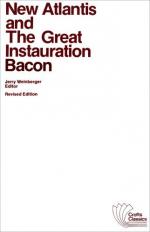|
This section contains 5,061 words (approx. 17 pages at 300 words per page) |

|
SOURCE: "Merchants of Light: Science As Colonization in the New Atlantis," in Francis Bacon's Legacy of Texts, edited by William A. Sessions, AMS Press, 1990, pp. 255-68.
Here, Whitney describes how Bacon's narrow focus in the New Atlantis foreshadows the many benefits of inductive science, despite his failure explicitly to address contemporary social problems.
Surely Robert C. Elliott's remark [in English Literary History 30, 1963] about the diversity of ideological response to Thomas More's land of Utopia could not find a counterpart with respect to Bacon's utopia in the New Atlantis: "Many claim it: Catholics and Protestants, medievalists and moderns, socialists and communists; and a well-known historian has recently turned it over to the Nazis." Where More's Utopia addresses a range of contemporary social problems in ways that have encouraged interpreters of later ages to do the same, the New Atlantis, especially in hindsight, seems much more narrowly focused on a...
|
This section contains 5,061 words (approx. 17 pages at 300 words per page) |

|


